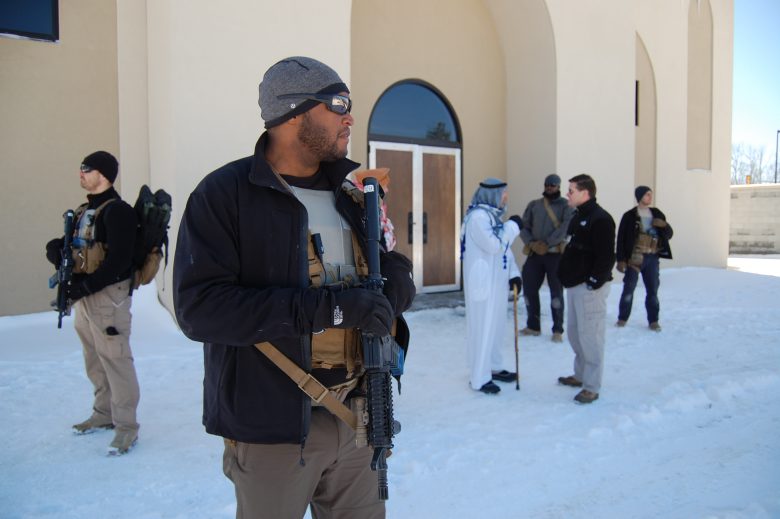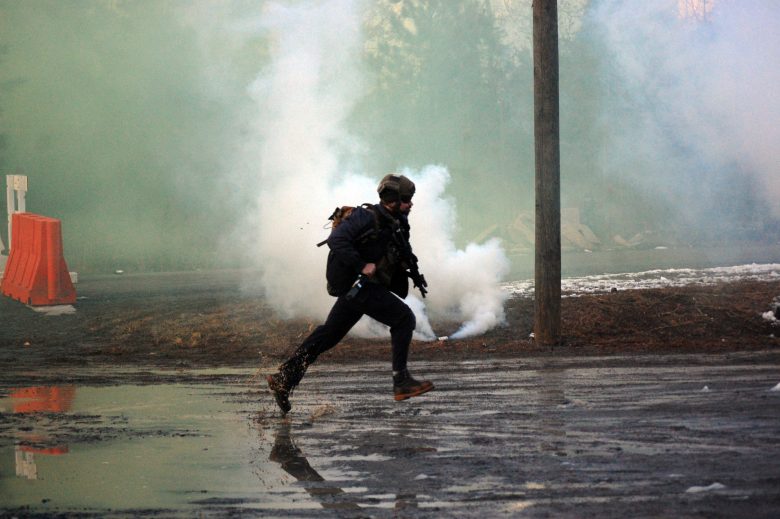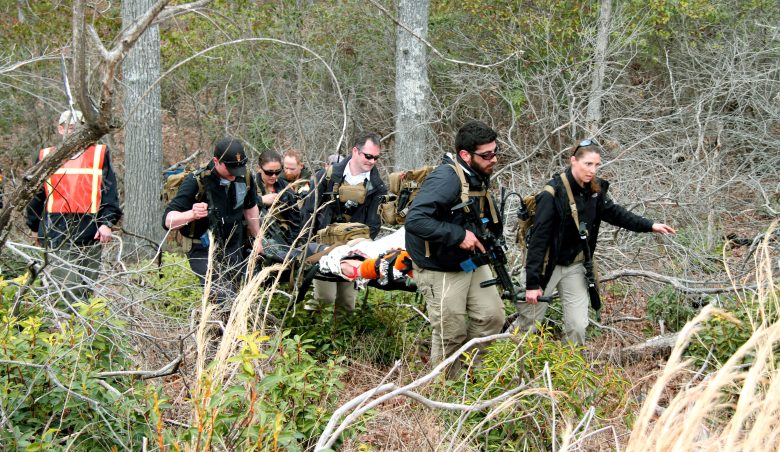By Sarah Sekula, published on espnw.com
For nearly four hours, Rebecca Drilling totes her rifle and a 40-pound bag filled with smoke grenades and medical supplies. She tends to the wounded while wearing a sweaty, bullet-proof vest and night-vision goggles. Crossing through streams and ravines, she hears blasts of small-arms gunfire from behind. Her shoes are waterlogged, pants soaked up to the knee.
The intensity is real. But everything else is simulated. In this nightmarish scenario, the gunshots are blanks. The gashes on the wounded are all fake. The setting is a top-secret locale in West Virginia, not a consulate in Kabul. In other words, special agent Drilling, 29, is going through high-threat tactical training, not for the faint of heart. For her, though, it’s all in a day’s work as a fearless Diplomatic Security Special Agent for the U.S. State Department. Her duty is to protect the Secretary of State, other U.S. government officials and visiting foreign dignitaries at any given moment anywhere around the world. This is her calling.
The 11 weeks of heart-thumping, chest-pounding training are unpredictable. Some days are spent in the mat room doing weapons take-away drills, outside for land-navigation training or at the firing range practicing things such as how to shoot a gun upside down. Other days, agents might practice treating bullet wounds or the proper way to evacuate a building that’s under threat.
In a training exercise, Diplomatic Security (DS) special agents protect a U.S. consul general (second from right) visiting a local leader, both portrayed by role players. The scenario took place during a high-intensity, multiagency four-day capstone exercise to reopen a U.S. consulate in a fictitious country. The exercise concluded the High Threat Operations Course for DS special agents and other U.S. government personnel assigned to overseas posts. (Due to security concerns, as a matter of policy, the State Department does not identify agents in photos. PHOTO: U.S. Department of State Photo)
They also focus on countersurveillance, emergency first aid and evasive driving skills. Think: Driving backwards in s-shapes in an armored vehicle while under gunfire, ramming a car to get it out of your path, escaping from an overturned vehicle and controlling a car while it is skidding.
“We never had a typical day,” she says. “They wanted to keep us on our toes. Every single second we didn’t know what skills we were going to be called on to use.”
Diplomatic Security special agents spend countless hours in simulated scenarios like this one: a roadside attack on a motorcade. PHOTO: U.S. Department of State Photo
As you can imagine, it’s to your benefit as an agent to be in tip-top shape. With this dangerous and difficult job, you never know when you’ll need to jog next to a motorcade for miles or escape a fiery building. So the agents also devote lots of off-the-clock time to both mental and physical fitness.
For Erika Wingerter, 24, it’s something she has unknowingly prepped for since her teenage years.
“I’ve been an athlete for the better part of my life,” she says. “So I’ve always felt the motivation to try and better myself. It changes when you become an agent. It adds a different kind of motivation to your workout. You want to be able to look at the person next to you and know they could carry you through the woods if you get wounded.”
In her downtime, Drilling focuses on CrossFit and high-intensity interval training exercises that mimic the conditions of her job — even when she’s on the road. “It’s about being flexible and doing things like bodyweight exercises in your hotel room,” she says, “When you are traveling, you might not have a gym available or it might not be a good environment for a woman to be going on a run through the neighborhood.”
During a high-intensity four-day exercise, Diplomatic Security special agents rely on their mental and physical stamina to successfully evacuate through thick brush and rough terrain. PHOTO: U.S. Department of State Photo
Some bring along resistance bands wherever they go. “They can fold up and be put in a to-go bag and checked on a plane,” says special agent Anthony Walker, 47, whose assignments have included Secretary of State protection detail for Colin Powell, working with NATO officials in Belgium and even security during the 2012 Winter Olympics. “Thirty minutes with those bands with the right exercises and you’ve really done a workout.”
Walker also peppers in max-capacity training every other day. In other words: four exercises, four reps each for 50 seconds per exercise with only 10 seconds of rest in between. He rotates through exercises such as jump squats, staggered push-ups, dive bombers, upright planks and jump kicks.
As if the physical workouts aren’t enough, there’s also a huge dose of mental gymnastics involved in their job. Even on days off, agents say they memorize license plates, sit near exits while dining out and always scan crowds for abnormal behavior.
Once the 600 hours of training is done, Jose Salinas, 32, a relatively new special agent, says it is a huge relief. “I’ve been in the military for 10 years,” he says, “but I haven’t done something so taxing mentally but physically, as well.”



